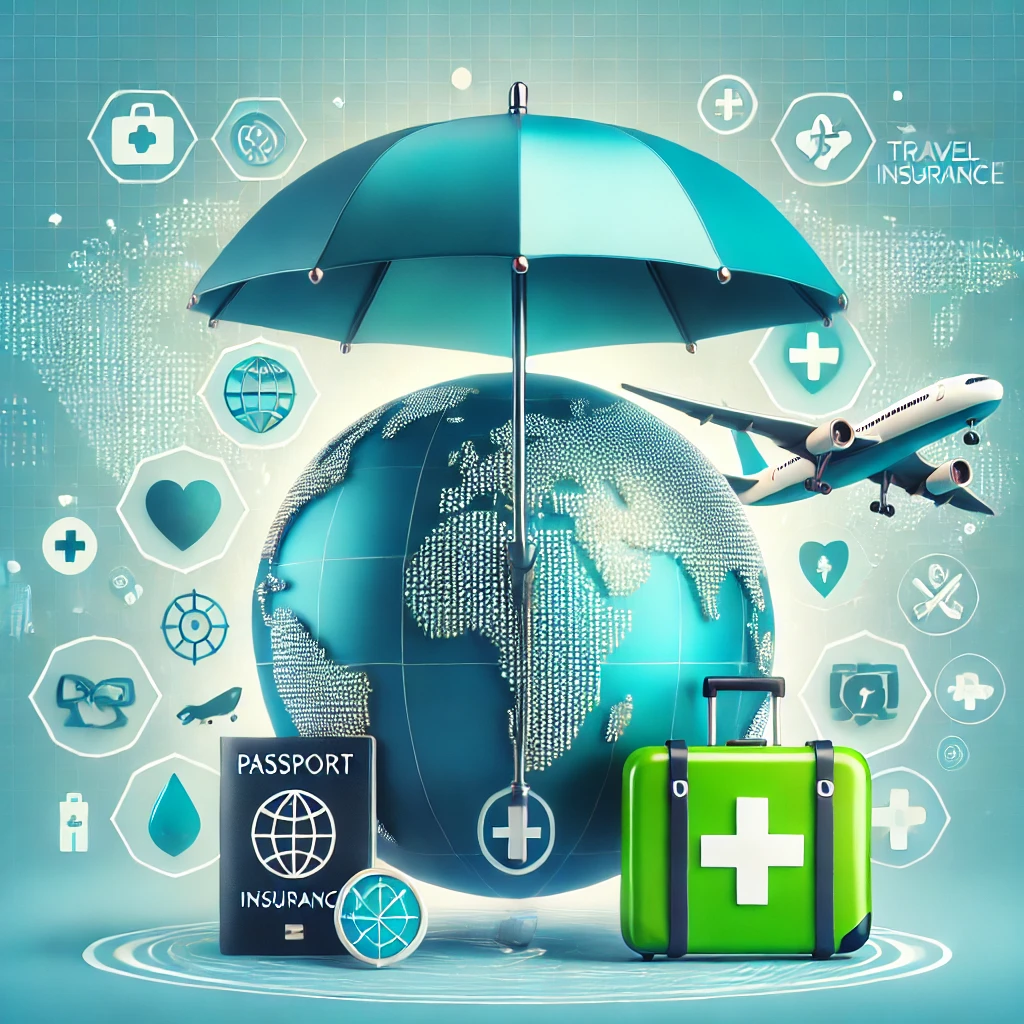Travel insurance is an essential component of trip planning, offering financial protection and peace of mind against unforeseen events that can disrupt your journey. Whether you’re embarking on a short vacation or an extended adventure, understanding the nuances of travel insurance can help you make informed decisions and ensure comprehensive coverage.
What is Travel Insurance?
Travel insurance is a policy designed to cover various risks associated with traveling. These risks can include trip cancellations, medical emergencies, lost or delayed luggage, and other unexpected incidents that may occur before or during your trip. By securing travel insurance, travelers can mitigate potential financial losses and receive assistance in emergencies.
Why Do You Need Travel Insurance?
While traveling can be an exciting experience, it also comes with uncertainties. Travel insurance serves as a safety net, providing coverage for:
- Medical Emergencies: Unexpected illnesses or injuries can lead to significant medical expenses, especially in countries with high healthcare costs. Travel insurance can cover these expenses, ensuring you receive necessary care without financial strain.
- Trip Cancellations or Interruptions: Unforeseen circumstances such as illness, natural disasters, or other emergencies can force you to cancel or cut short your trip. Travel insurance can reimburse non-refundable expenses, minimizing financial loss.
- Lost or Delayed Luggage: Misplaced or delayed baggage can disrupt your plans. Insurance can compensate for lost items and cover essential purchases if your luggage is delayed.
- Travel Delays: Flight cancellations or delays can lead to additional expenses for accommodation and meals. Travel insurance can cover these unexpected costs.

Types of Travel Insurance Coverage
Travel insurance policies offer various types of coverage to address different needs:
- Medical Coverage: Covers medical expenses incurred due to illness or injury during your trip. This can include hospital stays, doctor visits, and emergency medical evacuations.
- Trip Cancellation/Interruption Coverage: Reimburses non-refundable expenses if you need to cancel or interrupt your trip for covered reasons, such as illness, injury, or unforeseen events.
- Baggage and Personal Belongings Coverage: Provides compensation for lost, stolen, or damaged luggage and personal items during your trip.
- Travel Delay Coverage: Covers additional expenses incurred due to significant travel delays, such as accommodation and meals.
- Emergency Evacuation Coverage: Covers costs associated with emergency medical evacuations or repatriation due to severe illness or injury.
- Accidental Death and Dismemberment Coverage: Provides benefits in the event of accidental death or serious injury during your trip.
How to Choose the Right Travel Insurance Policy
Selecting the appropriate travel insurance policy involves assessing your specific needs and understanding the coverage options available. Consider the following factors:
- Destination: Some destinations may have higher medical costs or specific risks. Ensure your policy covers the regions you plan to visit.
- Duration of Trip: The length of your trip can influence the type of coverage you need. Longer trips may require more comprehensive policies.
- Activities Planned: If you plan to engage in high-risk activities like skiing or scuba diving, ensure your policy covers these activities.
- Pre-Existing Medical Conditions: Disclose any pre-existing conditions to determine if they are covered under the policy.
- Policy Exclusions: Carefully read the policy to understand what is not covered, such as certain activities or events.
Travel Insurance
Frequently Asked Questions (FAQs) About Travel Insurance
1. Is travel insurance mandatory?
While not always mandatory, some countries require proof of travel insurance for entry. For example, travelers applying for a Schengen visa must have travel insurance covering at least €30,000 for medical emergencies.
2. When should I purchase travel insurance?
It’s advisable to purchase travel insurance soon after booking your trip. This ensures coverage for unforeseen events that may occur before your departure. Some policies offer additional benefits if purchased within a specific timeframe after booking.
3. Does travel insurance cover COVID-19-related issues?
Many travel insurance providers now offer coverage for COVID-19-related medical expenses and trip cancellations. However, coverage varies by policy, so it’s essential to review the terms and conditions carefully.
4. Can I get coverage for pre-existing medical conditions?
Some policies offer coverage for pre-existing conditions, often requiring the purchase of the policy within a certain period after booking your trip. It’s crucial to disclose all medical conditions to ensure appropriate coverage.
5. What is ‘Cancel for Any Reason’ coverage?
‘Cancel for Any Reason’ (CFAR) is an optional add-on that allows you to cancel your trip for reasons not typically covered by standard policies. CFAR usually reimburses a percentage of your trip costs and must be purchased within a specific timeframe after booking.
6. How do I file a claim?
To file a claim, contact your insurance provider as soon as possible. Provide necessary documentation, such as receipts, medical reports, and proof of expenses. Keep copies of all documents and follow up regularly on the status of your claim.
7. Does travel insurance cover lost passports?
Many travel insurance policies provide assistance services for lost or stolen passports, helping you obtain replacements. Some may also cover associated expenses.
8. Is travel insurance necessary for domestic trips?
While often associated with international travel, travel insurance can also be beneficial for domestic trips, covering cancellations, delays, and medical emergencies not covered by your health insurance.
9. Can I extend my travel insurance if I decide to stay longer?
Some insurers allow policy extensions if you decide to extend your trip.
Its important to notify your provider before your policy expires to avoid gaps in coverage.

Common Mistakes to Avoid When Buying Travel Insurance
- Skipping the Fine Print:
Many travelers overlook the policy’s terms and conditions. Be sure to understand exclusions, claim processes, and coverage limits. - Underestimating Coverage Needs:
Opting for minimal coverage to save costs can lead to insufficient protection. Tailor your policy to your specific needs, such as medical coverage for destinations with high healthcare costs. - Ignoring High-Risk Activities:
If you’re planning activities like skiing, diving, or trekking, ensure they’re included in your coverage. Many basic policies exclude adventure sports. - Delaying Purchase:
Waiting too long to buy travel insurance can mean missing out on coverage for trip cancellations or pre-trip interruptions. - Failing to Disclose Pre-Existing Conditions:
Omitting medical history can result in denied claims. Always disclose pre-existing conditions during the application process. - Assuming All Policies Are the Same:
Different providers offer varying terms and benefits. Compare policies carefully to find the one that best fits your requirements.
How Much Does Travel Insurance Cost?
Travel insurance costs vary based on several factors, including:
- Trip Cost: Higher trip costs generally result in higher premiums.
- Traveler Age: Older travelers may face higher premiums due to increased health risks.
- Destination: Countries with higher healthcare costs can lead to increased premiums.
- Duration: Longer trips typically result in higher insurance costs.
- Coverage Level: Comprehensive policies cost more than basic plans.
On average, travel insurance can cost between 4% and 10% of your total trip expenses. It’s wise to obtain quotes from multiple providers to compare prices and benefits.
The Benefits of Travel Insurance
Travel insurance is more than a safeguard—it’s an enabler that lets you travel with confidence. Here’s how:
- Peace of Mind:
Knowing you’re covered for unexpected events allows you to enjoy your trip without worry. - Financial Protection:
Insurance mitigates financial risks, covering costly emergencies like medical evacuations or trip cancellations. - Assistance Services:
Many insurers provide 24/7 assistance hotlines to help with emergencies, from lost passports to finding medical care. - Global Reach:
With coverage in various countries, you’re protected no matter where your adventures take you. - Support in Unfamiliar Situations:
Travel insurance providers often assist with navigating language barriers or finding local resources.
Travel Insurance in a Post-Pandemic World
The COVID-19 pandemic has reshaped the travel insurance industry, with more policies including provisions for:
- Quarantine Coverage:
Reimbursement for additional accommodation costs due to mandatory quarantines. - Trip Interruption Due to Illness:
Coverage for returning home if you contract COVID-19 during your trip. - Vaccination Requirements:
Policies covering delays or cancellations due to vaccine mandates or requirements.
Travelers are increasingly seeking policies with comprehensive pandemic-related coverage, making it crucial to review these provisions when selecting insurance.
Steps to Buy Travel Insurance
- Assess Your Needs:
Determine what coverage you require based on your destination, activities, and health. - Research Providers:
Compare insurers, focusing on reputation, reviews, and policy offerings. - Request Quotes:
Obtain multiple quotes to compare pricing and coverage options. - Read the Policy Document:
Carefully review terms and conditions to ensure the policy meets your needs. - Purchase the Policy:
Once satisfied, finalize your purchase online or through an agent. - Keep Documentation Handy:
Carry your policy number and the provider’s contact information during your trip.
Travel Insurance vs. Credit Card Coverage
Many credit cards offer travel insurance benefits, but there are significant differences compared to standalone policies:
- Coverage Limits:
Credit card travel insurance often has lower coverage limits and fewer benefits. - Exclusions:
Adventure activities and pre-existing conditions are commonly excluded. - Claims Process:
Filing claims through credit card providers can be more complex and time-consuming.
Standalone travel insurance policies provide broader and more customizable coverage, making them a better option for most travelers.
Real-Life Scenarios Highlighting the Importance of Travel Insurance
- Medical Emergency Abroad:
Sarah, traveling in Southeast Asia, contracted a severe infection requiring hospitalization. Her $15,000 medical bill was fully covered by her travel insurance policy. - Cancelled Family Vacation:
The Smiths had to cancel their dream European vacation due to a family emergency. Their insurance reimbursed them for non-refundable expenses, saving them thousands. - Lost Luggage:
John’s luggage went missing en route to his business trip. His travel insurance compensated him for essential items and replacement clothes. - Flight Delays:
A snowstorm delayed Emma’s flight, requiring an overnight stay. Her policy covered accommodation and meals during the delay.
These examples demonstrate how travel insurance can save the day in unexpected situations.

Top Travel Insurance Providers
While selecting travel insurance, consider these industry-leading providers known for their comprehensive policies and excellent customer service:
- Allianz Travel Insurance:
Offers customizable plans with 24/7 assistance and extensive medical coverage. - World Nomads:
Popular among adventure travelers for covering high-risk activities. - Travel Guard by AIG:
Known for its robust trip cancellation and interruption coverage. - AXA Assistance USA:
Provides policies with pandemic-related coverage and strong customer support. - Generali Global Assistance:
Offers a variety of plans with excellent emergency assistance services.
Conclusion
Travel insurance is an indispensable tool for modern travelers, providing financial protection and peace of mind in an unpredictable world. By understanding your needs, researching policies, and carefully selecting the right coverage, you can enjoy your adventures knowing you’re protected.
Invest in travel insurance—it’s a small price to pay for safeguarding your dream trip.



